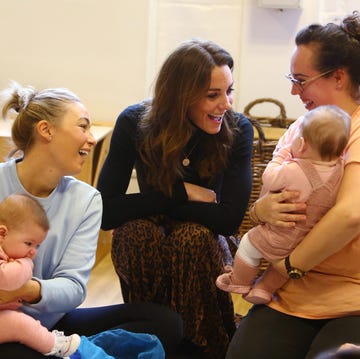I suppose I only have myself to blame. Looking to former I'm a Celebrity contestant Nigel Farage for insightful commentary about women in the working world is the equivalent of eating candyfloss for nutritional value. Yet here I am, reading the viewpoint of a person you could pay £63 on Cameo to record a personalised video – and, all too predictably, feeling outraged by it.
During a lunch in parliament this week, Farage told journalists that women make “very different life choices” when compared to men.
“Look at business,” he said. “Men are prepared to sacrifice their family lives in order to pursue a career and be successful in a way that fewer women are.”
It’s hardly surprising that Farage has antiquated views; they are, after all, in keeping with Reform UK’s election manifesto. The 28-page pamphlet (a flimsy effort, compared to the short tomes released by both the Labour and the Conservative parties last year) said: “The majority of mothers would choose to stay at home more if they could” – which was not based on any research and is directly in contrast to actual figures. A report by Careers After Babies found that 98% of mothers want to go back to work after having children, but only 13% think it's viable on a full-time basis. Of the 24% that tried to go back full time, 79% ended up leaving.
But what more can we expect from the man who claimed in 2014 that women who take time off work to have children are “worth less” to employers in the financial industry than men?
It’s a patronising and reductive take that erases the real difficulties women face when it comes to juggling motherhood and careers. Studies show that a significant percentage of women are still disproportionately responsible for childcare, with data indicating that during lockdowns women were carrying out two-thirds more childcare duties than men. At the height of the pandemic 71% of women felt they had assumed most of the responsibility of raising children. Meanwhile, the Office of National Statistics shows that women carry out an overall average of 60% more unpaid work than men (including caring for relatives and housework). Women are often expected to shoulder these burdens alone while also juggling a job.
So it’s of no surprise that women feel that too much is expected of them, particularly when it comes to being at work and being a mother. A new study by Bazaar's sister publication Good Housekeeping found that 51% of new mothers put too much pressure on themselves, and that 40% believe the idea that women should be the “perfect mother” is still pervasive.
Farage’s comments may also seem disrespectful to the increasing number of women who decide not to have babies. More than half of women who are childfree by choice say they are still treated as unusual or somehow “lesser” women for opting out of motherhood. You’re damned if you choose work, and you’re damned if you choose childrearing.
Like many of his policies, the patronising narrative being offered up by Farage offers nothing beyond generating outrage. He does not suggest any changes or remedies to help the workplace be more accessible to women who opt to have both a career and children. He merely blasts those who do as unwilling to make the ‘sacrifices’ necessary to succeed.
Frankly, the only way forward is to pay no notice. Perhaps Farage should spend less time at lunches lecturing where women should be, and more time observing his own, entirely male, political party, which is already falling apart. Time for a ‘life choice’ away from politics, Nigel?














